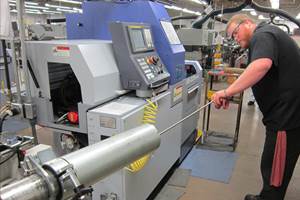Qualifying for Medical Work: Advice from a da Vinci Shop
Swiss shop with heavy medical experience shares how to get and keep medical customers.
Medical is hot—no doubt about it. Everybody wants in. But do you have what it takes to cut extremely complex parts out of feisty, exotic materials and deliver them certified with zero defects?
It’s worth the trouble if a company has the tenacity. Companies doing medical parts today are growing—even in this wicked recession. Mike Haupers is tenacious. He’s unstoppable. And, apparently, he’s also a great person to do business with. According to Mr. Haupers, president of Swiss Precision Machining (SPM) in Niles, Ill., 90 percent of his medical and dental business comes to his shop by word of mouth. He has impressed many people through the years. But perhaps one of the most important impressions was the one he made on Intuitive Surgical (Sunnyvale, Calif.), manufacturer of the revolutionary da Vinci Surgical System. The da Vinci robot is all over the news these days, but in case it is still unfamiliar, the sidebar on page 26 explains more.
Mr. Haupers’ company is making critical pulleys, pins, shafts and actuating mechanisms for the da Vinci robot. It also makes lots of other medical and dental parts—to the tune of about 30 million parts per year. Business is so good that he is remodeling to add a cleanroom and a conference space.
Thirty Years of Experience
Mr. Haupers started running his first lathe when he was in 7th grade. (His father was a dental instrument maker and ran a machine shop out of their basement.) Even then he was driven to take on whatever was thrown at him next.
“We were doing dental points for scalers,” he recalls. “The material was W1 tool steel, which was readily machinable. Then, between my 8th grade and freshman year of high school, they changed over to 440A stainless, which was a totally different ballgame. In those days, we didn’t have inserts, so you had to grind your own tools. I got out the machinery handbook and started experimenting with various tools to get a better finish and a better product with this material. 440A was a lot harder to machine.”
Mr. Haupers moved to chuckers next—two Hardinge HLVs retrofitted to be similar to Swiss machines. In his college years, the machines were moved out of the basement and into a captive shop for the largest dental manufacturer in the Chicago area. That’s when they purchased their first real Swiss machine—or rather, three, Tornos cam machines—to create double-ended dental tool handles.
When Mr. Haupers left college, he took over as supervisor. The shop grew to 22 Tornos machines, and it was still machining the 440A stainless, plus Trimrite, some 420, 303 and other 300 series materials.”
Mr. Haupers’ ingenuity continued as he automated four of the Tornos machines by adding hoppers to feed the dental handles into the machine and eject finished parts. Then one day, he got word that Tornos was selling 40 of its R125s that had been retrofitted in Switzerland to new standards for $12,000 each. “If you were running up at 12, 15, 20 parts a minute, you couldn’t beat these cam machines. They are magnificent—always have been.”
He pitched the purchase to his boss. But instead of purchasing the machines themselves, they helped him start up his own captive shop, SPM. Thirty years later, the shop is still doing all of its pre-machining, but now it serves Intuitive Surgical and many other medical companies.
Get Experience With the Exotic Materials
When a potential medical customer visits a shop and asks if it has any experience with new medical material, the answer most shops would like to give is, “Yes!” But it is tough for a company to get medical experience if it hasn’t landed a bona fide medical job. However, to work around this, a shop can call a local materials supply house and order some of the latest medical material. That’s what Mr. Haupers did.
“When we see a material on the rise, we actually go out and purchase the material. When titanium first came out, I just went and bought titanium and started doing various machining operations on it to see what would happen. How did it cold form? How did it deep hole drill? Small drill? How did it do in milling operations? Turning operations? To be honest, back then, many things they were saying in the machining books, we actually found out to be reversed. Until you get it in-house and really work with it, you’re in uncharted territory. And there are a lot of things that we do differently than the books say on some of these newest materials.”
A minimum amount of material must be purchased, of course, which can set a shop back thousands of dollars (the titanium test Mr. Haupers ran cost around $2,000). As Mr. Haupers says, “It’s not money poorly spent. Usually, new materials will sit out there for a year or so, and then a job will come in that uses the material.” And you’ll be ready.
Start Small and Work Your Way Up
Baby steps lead to expertise. “When we bought our first Tornos, we started with the simple cam machines, and the only extra we had was the three spindle front drilling attachment,” Mr. Haupers says. Then we grew to the point where we were using almost every attachment Tornos made, and it made a lot of attachments. We went from very simple to very complex machining. Our goal was to continually eliminate our secondary operations. We grew the same way with the CNCs. We started with a very basic two- to three-axis machine and grew from there, quickly. Once you understand an axis, it doesn’t matter if you have one or 50.”
Scout Out New Technology
Tim Sonnenberg, SPM general manager, has been charged with the task of continuously improving the company—that’s all he does. “Tim is a jack of all trades and my right-hand man,” Mr. Haupers says. “He constantly calls all the different machine tool dealers that we work with and sends them prints. It’s Tim’s job to see what we need, and then we start planning how to get it.
“I look at what my company needs today, and what I think we’ll need in 6 months, a year, 2 years, and beyond. And I say, ‘Go take a look at this—research this.’ Then Tim comes back and tells me what the costs are, what it will do for us, and what it will do for our customers. What we want to do is make sure that we provide the most economic product and the highest quality product for all of our customers.
He continues, “We try to stay right on the cutting edge with new materials, new cutting inserts, and so on and so forth. Right now, we’re looking at some additional Tornos machines and also a new type of pecking drill that does an automatic interrupted cut for when you’re dealing with material like 316 stainless steel—a hellacious chip. It’s a very interesting design. Tim e-mailed me and said, ‘You want to see this thing?’ If you’re taking a deep cut and you’re trying to drill deep in those materials, it can be somewhat of a nightmare.
“With Intuitive, we are seeing growth—different parts—different materials. As I am with all my other customers, we’re doing very well, and I think it’s because of the culture we have with all of our employees. My operators, my machinists, my QC people are constantly coming to me saying ‘I think we can improve this.’ And you’ve got to be open-minded and listen to them. Those are the guys in the trenches.”
Take on New Systems and Processes
Mr. Haupers’ motto is: “Make the part better than the customer wants and you never have a problem.” SPM is an ISO 9001:2008 certified shop heading toward Six Sigma. “To be in a Six Sigma, zero-defect environment, you can do acceptable quality levels, but in my experience, you need to check as much of the product as you can. The route to do that is automation.”
SPM bought a basic inspection machine and built an impressive custom automated assembly system for the da Vinci pulleys. It starts with a Rodix hopper where the pulleys are loaded up and fall into a Vibracraft vibration bowl. An inline camera sounds an alert when the hopper is empty so it can be reloaded. The parts travel from the vibration bowl down a track into a sealed glass cabinet where a second camera station monitors for misloaded parts. There, a programmable screwdriver puts the pulleys together, precisely measuring torque, into finished assemblies. After the parts are assembled and inspected, they are vacuum-sealed and shipped. When Intuitive receives its product, the product is correct. There are no issues, and it goes right to the assembly line.
How difficult is the ISO certification to achieve? “We came out of dental, so in the early years, we were already used to knowing the quality had to be there. But I don’t think our paperwork was,” Mr. Haupers explains. “In the first year of my business my father came over to work for me. He was very good because he was an instrument maker, and the majority of our product was being made for the dental industry. He knew exactly what to look for. From there, we trained other people as we grew. My wife is the comptroller of the company, and she came out of the insurance industry. She got everything going—purchase orders, material certifications, and so on. Back then, our QC department was also our shipping department. Besides being inspected, the parts would have to be counted, packaged and shipped properly.”
SPM also developed its own job management software package to track jobs from estimating through shipment over time. And recently, they purchased an automated tool crib vending machine that requires operators to log in and “check out” inserts, so everything can be tracked in realtime.
Mr. Haupers says, “When we went to be certified, the gentleman from ISO sat down after the first day and said, ‘You guys should be used as a barometer, an example for how you go about it.’ We thought it was going to be a long, drawn out process, but he said pretty much everything was in place. There were a few things that we needed to be documented differently, but were documenting everything. We were certified in a week. Even now, when they come back to do a recertification, they’re amazed at how accurate we are.”
The takeaways? The more a shop automates quality control, the better. It is most helpful to assign people with a keen eye to oversee a company’s processes and a paperwork guru to trace everything through the shop.
Form Solid Partnerships
Customer relationships are, of course, the most important cog in the machine. SPM has developed a solid relationship with Intuitive Surgical and its other clients over time. Since Intuitive likes their vendors to take on as much responsibility for the product as they can, solid partnerships are essential.
Proof is that when Intuitive recently moved their assembly lines, it asked SPM to check it out. “They know that when we understand their processes we may be able to come up with something on our side to help them or vice versa,” Mr. Haupers says. “They understand our capabilities, and they also know that we have abilities beyond the equipment we have right now. Our partnership with Intuitive has opened up other doors for us because they have recommended us to other people.
“Since the big push now with Intuitive is to control more of the processes and achieve zero defects, we have to have great relationships with our vendors. We want vendors that treat Swiss Precision like Swiss Precision treats Intuitive—with concern for quality. If you have a vendor that is doing a simple operation but a critical operation that they don’t give appropriate care to, then you end up having nightmares. If we feel a vendor isn’t capable of doing a job because of their attitude, or because they are afraid to invest in themselves, we have to move on.”
SPM performs many operations in house, but they use outside grinders and anodizers, and of course, they have material suppliers, machine tool builders, and consumable suppliers with whom they have vendor relationships. When Mr. Haupers evaluates his own vendors, he looks for high quality, and as long as he’s getting great service, he’s loyal. “When they are assured that I’m going to continue to do business with them, they have a vested interest in giving me quality service and backing me up. So, good service, confidentiality—that’s what I’m looking for.
“I like to partner with companies; I want them to know me and know my management style so we both know what to expect from each other. For example, I’ve always liked Tornos’ style. The company’s knowledge is incredible and the service is great.”
Sometimes, Mr. Haupers’ partnerships go above and beyond the norm. During this recession, a couple of his best vendors found they were struggling. So, he called his management team together and found some projects they were doing in-house that could be transferred over to his vendors to help them get through this considerably hard time.
Buy the Right Equipment
Mr. Haupers became excited when he saw he could cut one of his da Vinci Surgical System parts on the Tornos machine 30-percent faster than he was cutting them on his other machines. “We had been doing the da Vinci Surgical System part in two halves on two machines. We wanted to consolidate it and drop it in one complete part to control the quality and improve cycle times.” In order to keep within Intuitive Surgical’s price parameters, it became a must to achieve this.
The things SPM found it likes best about its Tornos Deco 13a models were multiple axes and the ability to overlap sequences effectively. It also liked having the Tornos come in as a turnkey. “With the CNC Swiss, we can overlap processes and still get top-notch quality. There isn’t a lot of vibration. These machines have a very sturdy, rigid base.”
The guys in Mr. Haupers’ shop have been impressed, too. “It opened a lot of people’s eyes when I took them out and showed them the modular system that Tornos has, and the multiple axes and the power tools.” The whole Swiss Precision team was dazzled by these “new” machines—not only because of the changes Tornos had made to the machines and the control that added tremendous value, but also because of the improved support the company was now delivering.
As Mr. Haupers makes plans for the future, he is thrilled to be able to include Tornos. “The company never stopped delivering a quality product going back to those early cam days of ‘true Swiss quality.’ And they have lots of experience with medical and dental parts.“
As the economy continues to creep along, and you’re trying to decide whether to hunker down or to act on the advice presented here and make the leap into medical, remember these parting words from Mr. Haupers.
“I’ve been through three or four recessions at this point. This company has always grown through a recession. Some people look at a recession as a bad thing. I look at it as an opportunity to grow, and we always have. We’ve grown during this one.”
Related Content
Video: Why a Production Machine Shop Started a Baseball Bat Company
A 153-year-old manufacturer of precision, metal pins recently started a side business creating custom wooden baseball bats. The reasoning behind establishing this new company is intriguing, as is how it has helped create a stronger bond with the local community.
Read MoreSoftware Controls Chip Breaking in Thread Turning Operations
This cutting tool manufacturer has developed a software module for chip control of thread turning operations in virtually any CNC lathe, even for older machines, using specific tooling and software.
Read More6 Tips for Training on a Swiss-Type Lathe
There are nuances to training a person to effectively operate a Swiss-type lathe. A shop I visited a while back offers some suggestions.
Read MorePursuit of Parts Collector Spearheads New Enterprise
While searching for a small parts accumulator for Swiss-type lathes, this machine shop CEO not only found what he was looking for but also discovered how to become a distributor for the unique product.
Read MoreRead Next
Do You Have Single Points of Failure?
Plans need to be in place before a catastrophic event occurs.
Read More5 Aspects of PMTS I Appreciate
The three-day edition of the 2025 Precision Machining Technology Show kicks off at the start of April. I’ll be there, and here are some reasons why.
Read MoreEmerging Leaders Nominations Now Open
Here’s your chance to highlight a young person in your manufacturing business who is on the path to be a future leader moving your company forward.
Read More


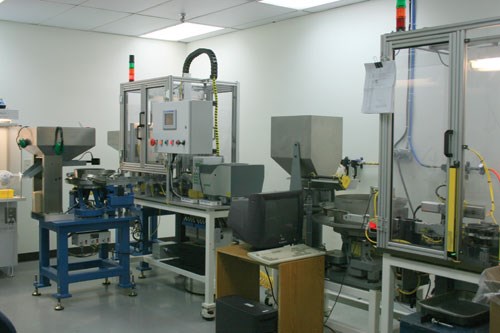
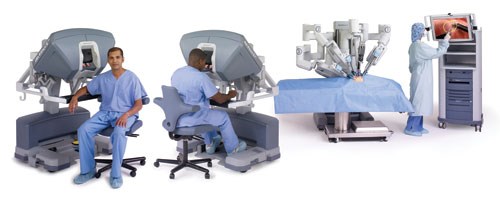
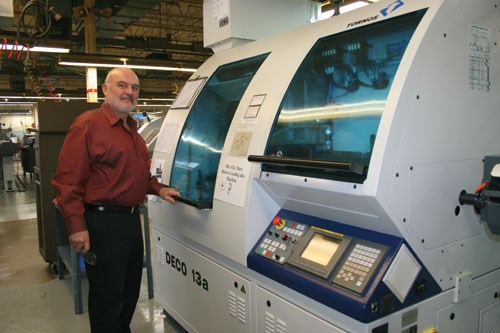
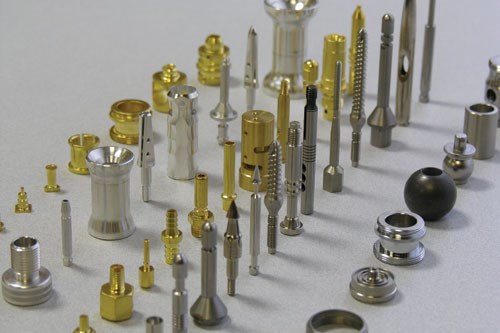
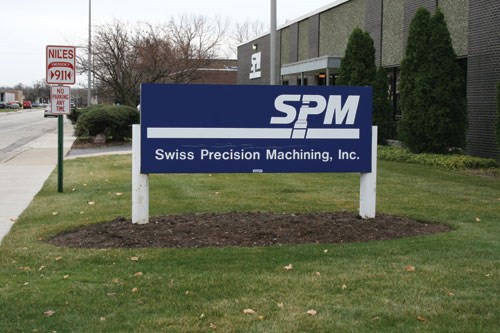






.jpg;maxWidth=300;quality=90)








